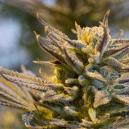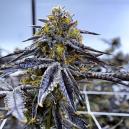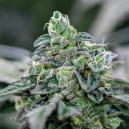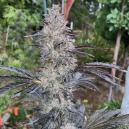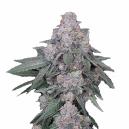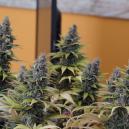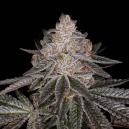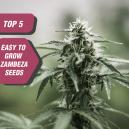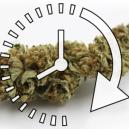Marijuana And Serotonin: What Is The Link?
Published :
Mar 14, 2019
Categories :
Medical cannabis

Cannabis shares its name with one neurotransmitter system, but it might share a special relationship with another. Links between the endocannabinoid system and the serotonin system run deep, and weed may have a direct impact on the brain's serotonin levels. These findings could have vast implications on the treatment of anxiety and depression.
You may notice an overlap between serotonin and cannabinoid territory: both seem linked to happiness, mood, arousal and emotion. Coincidence? Or do these two neurotransmitter systems share a deeper relationship than anyone suspected?
We will dive into all facets of this question, including the relationship between endocannabinoids and serotonin, whether cannabis can fight depression, and what you can do about it.
WHAT IS SEROTONIN?
Serotonin is neurotransmitter of the monoamine family, which also includes dopamine and epinephrine. Serotonin is linked to mood, sleep cycles, dominance hierarchies, digestion, wound healing, appetite, cognition, memory, and many other complex functions. 90% of the body’s serotonin is secreted by the cells of the GI tract and circulated by blood platelets. The remainder is located in the brain.

SEROTONIN AND DEPRESSION
Low levels of serotonin are linked to mental illnesses, like depression and anxiety. Depression is characterized by feelings of sadness, apathy, lethargy and meaninglessness. It can be deeply debilitating and can destroy a sufferers’ ability to function. Anxiety disorders are characterized by inappropriate and excessive activation of the sympathetic nervous system, and is characterized by frequent and sometimes objectless fear, stress and worry.
A common treatment for depression is to take SSRIs, which block the reuptake of serotonin and thereby increase its levels in the brain. Another class of antidepressants, MAOIs, also increase levels of serotonin by inhibiting enzymes that break down serotonin, along with dopamine and epinephrine.
Antidepressants help a lot of people, but they have some drawbacks. Many cause side effects, like weight gain, nausea, sexual problems, insomnia, dry mouth, constipation and blurred vision. Furthermore, some studies show that antidepressants can be ineffective or even counterproductive over the long term.
Anxiety is often treated with benzodiazepines, which are highly addictive and can interfere with the consolidation of memories.

CANNABINOIDS AND SEROTONIN
The body’s endocannabinoid and serotonin systems seem to be closely linked. A 2011 study linked endocannabinoid dysfunction to anxiety and depression, and further, to serotonergic activity. Further research has shown that exocannabinoids have increase serotonin levels in the prefrontal cortex, an area of the brain particularly implicated in depression.
Cannabis has also been linked to serotonin activity in the 5-HT1A receptors of the paraventricular nucleus of the hypothalamus. Deficient activity of these receptors has been linked to anxiety. Cannabis has been shown to agonize these receptors, thereby potentially reducing the symptoms of anxiety.
Some studies have linked cannabis use with increased activation of the 5-HT2A serotonin system. These receptors are famous for their activation during psychedelic trips, and are linked to increased creativity, greater emotional sensitivity, and occasional hallucinations.
COULD CANNABIS TREAT DEPRESSION AND ANXIETY?
The relationship between cannabis and depression is complicated. One 2007 study found that at low doses, THC increased serotonin levels, but at high doses, it reduced them. This is likely due to the biphasic effects patterns of cannabis, where it sometimes produces opposite effects at high doses than at low doses.
A more recent study corroborated these results, and further found that an antidepressant and a cannabinoid administered at low doses seemed to behave in synergistic ways. This suggests that cannabis might be less a replacement for antidepressants than a supplement to them. It further found that antagonizing CB1 receptors—in other words, doing the opposite of THC—cancelled out the effects of antidepressants.
Another study increased the inhibitor of the enzyme that breaks down anandamide—one of the body’s main endogenous cannabinoids—and in that mimicked the effects of a MAOI but for endocannabinoids. This study found this treatment to be as significant as Citalopram in treating anxiety and depression, and linked this effect to 5-HT1A and 5-HT2A/C serotonin activity.
It’s not just the cannabinoids that fight mental illness. β-caryophyllene and D-limonene, both terpenes, were found to have powerful antidepressant and anxiolytic effects. It’s unclear how these effects are linked to the body’s serotonin systems.
The picture isn’t completely rosy, however. Long-term, chronic cannabis use has been linked to depression and alterations of the 5-HT family of serotonin receptors. There isn’t enough information to draw hard and fast conclusions, but these results should be enough to give pause to serious potheads with a tendency towards depression.

BEST STRAINS TO FIGHT DEPRESSION AND ANXIETY
There’s an old rule of thumb: if you’re looking to fight depression, go with a sativa, and if you’re looking to fight anxiety, lean more towards the indicas. This is an oversimplification, but there’s some truth to it. As the studies above attest, for both depression and anxiety, it’s best to pick a strain with a broad range of cannabinoids and terpenes, and to stick to lower doses. Also, don’t discontinue your medication without medical supervision.
 WHITE WIDOW
WHITE WIDOW
If you’re looking for a strain to kick your depression out, White Widow could do the trick. She’s a balanced hybrid, and so can be used for both depression and anxiety. If you’re feeling down, have no energy, or just want to refresh your state of mind, White Widow is an excellent strain to energize, uplift and clear your mind.
 NORTHERN LIGHTS
NORTHERN LIGHTS
Northern Lights is a great choice for fighting anxiety. This indica-dominant hybrid relaxes the muscles of the body and the tensions of the brain, allowing for a full body rest. Northern Lights also has powerful euphoric effects, which may help relieve depression, if the user can deal with the possible inertia of an indica blast.
 SUPER SILVER HAZE
SUPER SILVER HAZE
Super Silver Haze is an award-winning strain, known for its happy-making effects. It’s a sativa-dominant hybrid which produces clear, joyful effects. It also boosts the appetite, which could be helpful for those, whose depression is affecting their eating patterns. Super Silver Haze is high in THC, so medicinal users should regulate their dosage.














